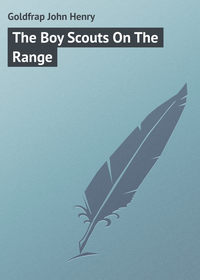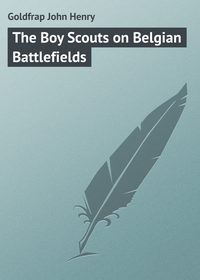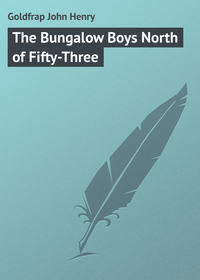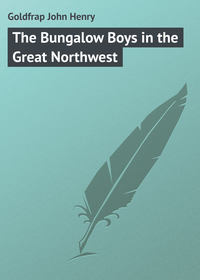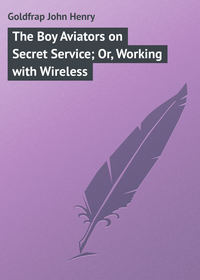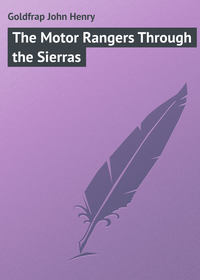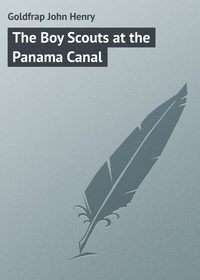 полная версия
полная версияПолная версия
The Boy Aviators in Nicaragua; or, In League with the Insurgents
“Yes, we can hardly expect much mercy from Rogero,” commented Mr. Chester. He then described to Don Pachecho what had taken place in Greytown the day that he had met the boys and Billy Barnes. Billy himself also conveyed his suspicions of Rogero as the murderer of Dr. Moneague.
The old don was greatly agitated at this news.
“Ah, the inhuman scoundrel!” he cried, raising his wrinkled hands above his head, “it was without doubt he that killed Moneague. And he now holds the secret of the lost mines. With his power over Zelaya and the wealth that is now at his disposal, he can speedily become powerful enough to ruin us all. I am an old man, Señors, but I do not think that of all the men I have ever seen, that I have met one who was this man’s equal in the resources of evil. Woe betide the man who falls into his clutches.”
Billy had been listening to this conversation with great attention and he now struck in with:
“What do you suppose he has done with the plan of the lost mines, sir?”
Don Pachecho shrugged his shoulders.
“Señor Barnes, there is only one thing that he can do with it, and that is to keep it always about him. I do not suppose it has been off his immediate person since he killed poor Moneague.”
Billy sat lost in thought for a while. Then he raised his head.
“I suppose if he lost it he’d cut up at a great rate,” he said, “at any rate, he’d give more attention to getting it back than to keep on licking the revolutionists.”
“Undoubtedly.”
“Hum,” said Billy, in a way he had when he had arrived at any important conclusion.
In the moonlight the party walked down to where the Golden Eagle lay under her extemporized garage, or rather aerodrome. Even Señora Ruiz forgot for a second her deep sorrow as she gazed at the beautiful creation, its graceful wings shimmered and silvered by the brilliant moonlight.
“Oh, Señors,” she cried, “you built this wonderful fly thing all yourselves?”
When their father had replied for the blushing Frank and Harry in the affirmative, the Spanish woman clasped her hands impulsively.
“But you are – oh, pardon me – but you are so young – chico, is it not so?”
“I take it that ‘chico’ is Spanish for ‘kids,’” remarked the irrepressible Billy sotto voce to Harry. What the latter might have replied to this, however, was cut short by a startling thing that occurred at that moment.
Frank who had been bending over the engine had given a loud exclamation.
“Harry – father – Billy, come here quick!” he exclaimed excitedly.
They ran toward him.
“Look here,” cried the boy, pointing to the engine, “some one has been tampering with the carbureter. They knew we could not replace it here without weeks of delay.”
“And by jimminy crickets!” cried Billy, who had been examining the engine on his own hook, “they must have been scared away just as we came down. See here,” went on the reporter, “they left in such a hurry that one of them forgot his hat and the sweatband is still warm and damp. Whoever monkeyed with this engine took off his hat to do it and he couldn’t have been at work very long for the hat’s still warm and besides, see here, he has only given the carbureter a few turns.”
Mr. Chester took the hat that the excited Billy thrust at him and regarded it with some attention. It was a greasy battered affair, but it was trimmed with a new black ribbon on which was sewn in red thread the words “Viva Zelaya.”
“Not difficult to trace some of our old friend Rogero’s work here,” he said. “He evidently means to keep his threat to prevent your flying.”
“We shall have to do sentry duty here for the rest of the night, Harry,” said Frank in a determined voice.
“You bet we will,” agreed his younger brother; an injury to their ship affected these boys far more than any hurt they themselves might sustain.
Rifles were secured from the house, also blankets, and the boys made up a regular camp-fire round which they sat long after Don Pachecho and his bereaved daughter had driven off and the lights in the house had been extinguished.
“I tell you what, Frank,” said Harry, “we have simply got to take a hand in this thing now. You know that if that fellow Rogero ever gets as far as this what he means to do to this plantation.”
“I know,” rejoined his brother, “he would take delight in ruining what father has built up and then blaming it on his troops and the worst of it is we would never be able to get any redress.”
Both boys were silent for several minutes, thinking things over.
“What’s the matter with taking a little spin in the Golden Eagle to-morrow and finding out just where he is, then we can shape our plans accordingly,” suddenly broke out Harry.
“Yes, but look here, Harry,” replied the conservative Frank, “you know that we are supposed to be non-combatants.”
“Oh, hang being non-combatants!” rejoined Harry, “we are not going to sit here and see our father’s plantation destroyed by this ruffian, are we? and you know too,” he went on, “that the amiable cuss promised to give us a chance to see the inside of a prison if he could lay his hands on us.”
“You are right there, Harry,” agreed Frank, looking up, “if the revolutionists are driven back any closer we shall have to take up arms to protect ourselves. It has never been the way of Americans to let any one walk all over them without registering a kick.”
“You bet ours is going to be an emphatic one, too,” enthusiastically cried Harry; “give me your hand, old chap – shake. It’s a go?”
“Yes,” replied Frank slowly, “it’s a go.”
“Hurrah,” shouted Harry, sitting up with his blanket up to his chin, “we’ll give you the spin of your life to-morrow, old Golden Eagle.”
It had been agreed that Frank was to take the first watch, and so while the elder brother sat rifle in hand, guarding the aeroplane in which they were destined to have such strange adventures in the immediate future, Harry slumbered the sleep of the just.
“I’ve only been asleep five minutes,” he protested when Frank woke him to do his “trick” on guard.
“You’ve had a three-hour nap,” laughed Frank, “and snored loud enough to have brought the whole of Zelaya’s army on us if they’d been around.”
Whoever the man was who had tried to disable the Golden Eagle, he did not put in any further appearance that night, nor did anything happen to vary the monotony of the night-watch. As soon as it was daylight the boys raced for the bath, plunged in, and after a refreshing swim made for the house.
They made for Billy’s room intending to drag that sleep-loving young person out and duck him head over heels into the bath at the deep end.
To their amazement the room was empty. The bed had not been slept in. Moreover, Billy’s camera and canteen were missing.
Pinned to the bedclothes was the following characteristic note, the effect of which on the boys may be imagined.
“Dear Frank and Harry.
“I have gone to get the plans that Rogero stole from Moneague. It will make a bully picture to go with my story when he is pinched. It is about up to me to do something. Regards to your father. Please apologize to him for my unceremonious departure for the warpath. Good luck to you, and I wish myself the same. So long.
Billy Barnes.”Frank gave a long whistle as he read this document.
“Well, of all the – ,” began Harry, and stopped. Words failed to express his feelings.
“This settles it,” said Frank suddenly with decision, “we’ve got to get after Rogero, now.”
“You mean that Billy – ,” began Harry.
“I mean that we’re not going to let Billy get shot for a bit of pottery,” cut in Frank.
“The Golden Eagle will sail at nine o’clock,” he added. “Come on, Harry – we’ve just time for a bit of breakfast, and then for the air.”
CHAPTER IX.
THE MIDNIGHT BELL
It required considerable persuasion on the part of Frank and Harry to induce Mr. Chester to allow them to undertake a trip which, to say the least, was hazardous. After a long talk, however, it was agreed that the boys were to be allowed to go providing that if they did not return within the next three days they were to use every effort to notify their father of their whereabouts.
All opposition being overcome, the boys, after a hearty meal, made a change into light woolen shirts, khaki trousers and rubber-soled canvas shoes. Soft felt hats of the army type completed their attire, and when they had each buckled on a belt to which were strapped magazine revolvers and slung field-glasses and water-padded canteens over their shoulders they were practically ready for their bold dash.
Frank at once made a hasty survey of the ground surrounding the palm-thatched aerodrome and decided that with a little clearing the Golden Eagle could be started without any difficulty if no wind got up. A force of men was at once put to work with machetes and long before noon a “runway” of five hundred yards leading downhill had been cleared, – Frank calculating that this would be sufficient to allow the aeroplane to lift and clear the taller banana bushes. The gasolene for the sixty-gallon tank had been shipped from Greytown at the time that Frank and Harry tuned up the Golden Eagle’s engine, and besides filling the tank to its capacity they loaded their craft up with several five-gallon cans for a reserve supply. A stock of the best cylinder oil and grease for the “screw-up” grease cups that lubricated the crank shafts completed the engine outfit.
The boys calculated on using a pint per horsepower an hour of fuel when the Golden Eagle’s engine was running at its greatest number of revolutions per minute. As they did not intend to turn up more than 800 revolutions – or R.P.M., as aviators call it – they calculated on a considerable saving of fuel unless some emergency arose.
While the runway was being cleared, several of the native workmen had been at work, under the boys’ direction, hauling away the ballast sacks with which the Golden Eagle had been weighed down at the time of her engine test. Harry had also produced a brand-new ensign which he ran up on halyards rigged to a stern stanchion, while his brother and father gave three hearty cheers for the fluttering Stars and Stripes.
The last thing the boys did before their final farewells was to tuck a map of the country over which they were to travel in a corner pocket of the pilot-house, and also load up a waterproof silk tent and an axe, shovel and pick.
“It’s always as well to be prepared for everything,” Frank remarked when his father questioned him about the utility of these last articles. “We don’t know but we may have to dig for water or – or anything in fact in which these tools will come in mighty handy.”
Mr. Chester nodded admiringly at his son’s foresight.
“That’s right, my boy,” he assented, “be ready for everything and you can’t go far wrong.”
“Now,” declared Frank, after the boys had gone over every stay-wire, stanchion and brace on the machine, and the engine had been carefully wiped and the brass parts polished, “the Chester expedition is ready to get underway!”
Harry hopped nimbly into the pilot-house and took up his seat at the rear of the chassis. His job was that of engineer. Captain Frank followed him a second later and with his hand on the guide wheel to which the controls were connected gave a comprehensive look over the aeroplane.
“What would the Junior Aero boys do if they could see us now?” Harry hailed from his seat, looking up from his adjusting of the grease cups.
“What wouldn’t any of them give to be going along?” responded Frank.
It had been arranged that the Golden Eagle was to be headed toward the northwest where, like a blue cloud, the Cordillera range loomed against the sky. Somewhere over in that little known part of the country Rogero and his men were marching toward the coast and – the thought thrilled in both the boys’ minds, though neither spoke of it – it was over there, too, somewhere in those dim blue mountains, that the lost mines of the Toltecs lay and the little known relics of that ancient civilization.
There was a final handshake between the boys and their father and a shouted good-bye to Jimmie Blakely.
“All right astern, Harry?” hailed Frank.
“Ay, ay, sir,” responded his brother.
Harry threw in the switch, having opened the valve that connected the engine with the gasolene tank a few minutes before. At the same instant Frank started the engine. There was an involuntary cheer from the hands who had clustered around the machine but at a respectful distance, recollecting their disconcerting experience at the time that Frank tested the engine.
With her fifty horsepower whirring round her propellers at eight hundred revolutions a minute, the Golden Eagle began to move. Faster and faster she glided over the ground till after a run of about two hundred yards her forward end lifted and she shot upward into the air as Frank’s trained hand had directed the upward gliding planes. The engine was going at its work with a will and the rhythmical purr, so sweet to the ear of the operator of an aeroplane, showed that there wasn’t going to be any balk out of it on this trip.
The watchers below saw the Golden Eagle, like a great yellow bird, leave the ground for the upper air in absolute silence. It was such an impressive sight that even the usually voluble natives failed to make any demonstration. At a height of about two hundred feet Frank pulled the control tiller hard over and the Golden Eagle swung round slightly on an almost even keel from the eastward course she was on and headed away to the northwest. The last the group at La Merced saw of her she was a dull bronze speck against the brilliant blue sky, heading steadily for the mountains at a height of about six hundred feet.
It had been arranged between the boys that they should keep going till dusk and then alight in some suitable place and make camp for the night. That they were running great and grave risks they well knew, but neither of them was of the caliber that talks much of such things and so as they forged steadily for the hills with the exhaust throbbing as evenly as a healthy pulse, their conversation was mainly about the course they should adopt to save Billy Barnes if he had actually fallen into Rogero’s hands.
That there would have to be quick action neither boy doubted. Rogero was not the man to stop at half measures, and that Billy would be shot or tortured after a drumhead court-martial; or, perhaps, with even not that attempt at legal formality, was practically certain.
As he sat at the wheel, Frank, from time to time, called Harry to take his place at the duplicate tiller wheel while he with the field glasses swept the earth below for any sign of any camp. The portion of Nicaragua over which the Golden Eagle was soaring is very sparsely inhabited. With the exception of an occasional river bank camp of wandering rubber-cutters, there is little human life.
“What are we making, should you judge, Frank?” asked Harry, when they had been underway about an hour with only the monotonous dull-green jungle, like a leafy carpet beneath them.
“Easily twenty,” replied Frank, “throttled down as we are.”
“Has it occurred to you that we are going to find some difficulty in securing a suitable landing-place?”
“I’ve been thinking of that,” replied the elder boy, “it is of course impossible to make a landing anywhere here, and I can’t for the life of me, see any break in the jungle in the direction we are headed.”
“No,” replied Harry, eagerly, “but have you noticed those hills? As we get nearer to them I can see through the glasses that there seem to be rocky plateaus on their upper ridges that would just about suit us for a settling-down place.”
“What do you propose then?” asked Frank.
“I was thinking that it would be a good idea to speed up a bit so as to reach the mountains by dark and make camp there till we can scout about a little and get Rogero’s bearings.”
“That’s a good idea,” replied Frank, “I’ve been thinking anyway that we would do Billy more harm than good if Rogero knew that we were flying to his rescue. Our best plan is to pitch our tent there in the hills on one of the plateaus and work from that point as our headquarters. There’s the question of gasolene, too, we don’t want to run out of that and the less needless flying we do the better say I.”
“How far do you suppose those hills are from us now?” asked Harry.
Frank consulted his map.
“Not more than fifty miles at the outside. We can make them easily by sundown if we speed her up,” he announced. As he spoke he increased the velocity of the engine till it was running almost at its revolution capacity. Under the increased impetus the Golden Eagle drove forward a good ten miles an hour faster.
As the hills grew nearer both boys eagerly focussed their glasses on them. At a distance the range had not looked to be a very considerable mountain formation, but on a closer approach the boys were astonished to see that they were a formidable chain of hills, slashed and cut into every direction by deep canyons, between which there were several broad plateaus almost entirely unwooded. In other places giant trees clothed the hills almost to their summits.
“One of those bare plateaus will make an ideal landing-place,” said Frank, as the Golden Eagle swung steadily forward toward her decided destination. “The big trees will screen us from the view of anyone except an airship scout and I don’t think that there will be much likelihood of our encountering one of those.”
It was twilight when Frank swung the starboard rudder over and the Golden Eagle began to describe swooping circles above a plateau about five hundred feet up on the mountain-side. It was a ticklish job to land, but under Frank’s skilful manipulation of the planes and rudders the boys’ ship settled down as gently as a tired bird toward the smooth surface of the plateau. As she struck the ground in a little cloud of dust, but without the slightest jar, Harry threw in the brake clutch that controlled the settling wheels and after sliding about twenty feet, the Golden Eagle came to a stop in the wildest part of the Cordilleras of Nicaragua. With a cheer both boys jumped out and excitedly assured each other that their adventures had really begun at last.
There was but little time that night to survey their landing-place. By the time the sun dropped, however, they had accomplished such good work that the tent was up, the portable cots erected and Harry had a fire lighted; while Frank had announced with a shout of triumph that he had found a little runnel of water oozing from the mountain-side which by a little enlargement with the pick and shovel soon formed a pool of clear, cold water.
It was with light hearts that the boys fell to on a supper of fried bacon, coffee and bread. There was not time to cook a more elaborate menu that night, but both declared enthusiastically that what they did have tasted to them as good as a banquet. Supper over and a lantern lighted in the tent it was arranged that Frank should take the first watch, lasting till midnight, and that he should then awake Harry who would do sentry duty till dawn. Till they learned if they had any undesirable neighbors this was agreed to be the prudent course.
After Harry turned in Frank looked over his rifle and revolver and took up a position by the camp-fire. He employed the early part of the night with pencil and pad, figuring out some aeronautical problems, but as it grew near to his hour to be relieved he grew so sleepy that he got up and paced about to fight off his drowsiness. He had made perhaps a dozen turns up and down in front of the tent when something happened that caused even the usually hard-headed boy to start violently and feel a queer sort of chill down his spine.
It was the tolling of a bell!
The hour, the loneliness of the spot all combined to augment Frank’s startled amazement at the sound. He could hardly believe his ears. With a beating heart he strained his attention to locate the sound. It seemed to come from a spot further up the mountain-side. Whoever the bell-ringer was he paid no attention to time or rhythm. The bell would toll loud and sharp for a few minutes and then its clangor would die down and almost cease. Then without any apparent reason it would start up again furiously. Hurriedly Frank awoke his younger brother.
“What on earth do you suppose it is? Spooks?” demanded the startled Harry.
“I don’t know, but it’s something human, and I mean to find out before we leave this place,” declared Frank, doggedly.
CHAPTER X.
THE ONE-EYED QUESAL
Seen in the bright light of the early tropic day the plateau upon which the Golden Eagle had settled was certainly an ideal spot for a boy’s camp. It was in form a rough circle about a quarter of a mile in circumference. To the west the mountain-side shot up in a rugged cliff. To the east a deep canyon cut down to the valley below, clothed heavily with huge Manacca palms, plane and rosewood trees, here and there interspersed by a lordly mahogany grove. Huge ferns as big as rose-bushes in America shot up out of the rich dark soil, and from the tops of many of the trees whose names were unknown to the boys trailed magnificent orchids and lianas and parasitic plants of many varieties.
From below it would have been quite impossible to have sighted the camp and the mountain above was so rugged and precipitous that any attack or observation from that quarter would have been most improbable. As soon as it was light Harry, with the collapsable canvas bucket went to Frank’s spring and got a supply of water. This done he set about getting breakfast. In the meantime Frank had been skirmishing about for fruit, and by the time the fragrant odor of Harry’s steaming coffee-pot had diffused itself about the camp the elder boy returned triumphantly with an armful of bananas and dark-green bread-fruit. Harry selected two of the largest of these last and cutting them open set them on the hot coals to roast.
“Why, where on earth did you learn tropical cookery?” demanded Frank as he watched Harry deftly turning the appetizing looking slices.
“I watched the natives down at La Merced,” replied Harry, “you see I figured that when you are in Rome do as the Romans do, and that as the jungle is good enough to provide us with ready-grown loaves we ought to return the compliment by knowing how to cook them.”
Naturally enough the boys’ conversation fell on the mysterious bell-ringing of the night before.
“I can hardly believe that I didn’t dream it,” remarked Frank.
“But I heard it too,” rejoined Harry, “and there is no question that it was a bell and a good, loud-toned one at that.”
“Well, what a bell-ringer, let alone a bell, can be doing round here is inexplicable,” said Frank. “I took a good look around before breakfast while I was out getting the fruit and I can see no sign of any habitation or settlement that might account for it.”
“You don’t think it possible that it could be a trick to scare us?” asked Harry.
Frank laughed.
“I considered that too,” he replied, “I hardly think that it could be that. Anyhow it will take a good deal more than that to frighten us away. Seriously though I would like to solve the mystery.”
“Maybe the monkeys hold prayer-meetings,” laughed Harry.
“What’s the matter with forming the Chester Exploration Expedition and taking a climb up the mountain after breakfast,” he broke out suddenly.
“You’re on,” rejoined Frank, “I think it will be perfectly safe to leave camp for a while anyhow and we may make some important discoveries.”
Accordingly an hour later the boys were making their first plunge into the practically unknown fastnesses of the Cordilleras of Nicaragua. Each carried a canteen full of water, a supply of roasted bread-fruit and several soup tablets besides matches in waterproof boxes and their revolvers and rifles. Of course a pair of field-glasses, and the axe also formed a part of their traveling equipment.
With all this paraphernalia it was hard work clambering up the rugged mountain-side more particularly as when their course required them to plunge into the jungle, they found their way impeded by huge snake-like creepers that hung from the trees and crawled over the ground in every direction. They had been climbing steadily for about an hour when Harry uttered an exclamation of delightful surprise.




